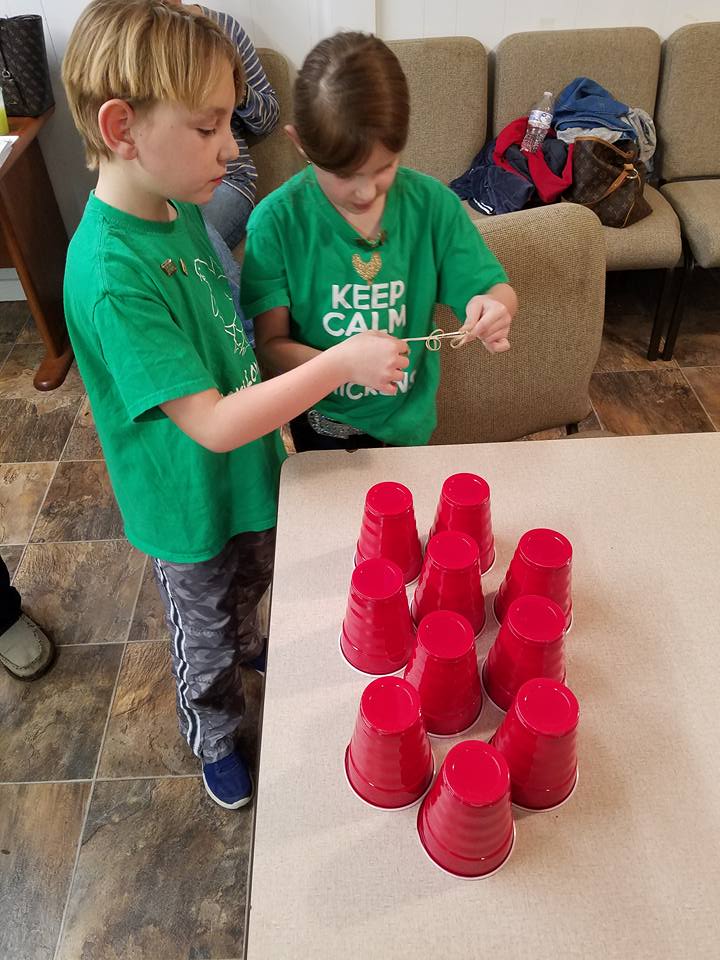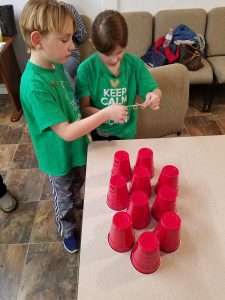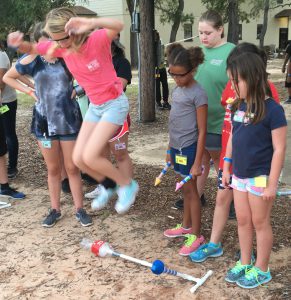by pmdavis | Jun 29, 2018
Summer time is a great time to teach youth about solar energy!
Use s’mores to teach your kids about two different types of energy: kinetic and radiation. Kinetic energy is energy in motion. Radiation is energy made through electromagnetic waves. Heat and light waves penetrate food without direct contact between the heat source and the food. Solar ovens, toaster ovens and microwaves are all methods of radiation cooking.
To make the solar oven like you see below, get a pizza box and follow these steps:
- Line the inside of the box with foil.
- Make an opening on the top of the box by cutting three sides leaving the other side attached so it flaps open.
- Cover the opening with clear plastic wrap.
- Assemble your s’more (see tips below).
- Close the lid of the box and raise the foil covered flap.
- Make sure the sun is reflecting onto the oven opening.

Remember to orient your box according the time and sun location. For example, if it’s late afternoon and the sun is on your right, you must be facing south. You would want to turn your oven so the reflective waves would be heating up your oven in more of a westerly direction.
Hints and Tips
- Place the graham cracker and marshmallow in the oven first.
- Add the chocolate once the marshmallow is partially cooked. (Otherwise, the chocolate will be liquid by the time the marshmallow is melted).
- Speed up the process by preheating your oven.
- Give yourself time and other activities to keep the group entertained. It took the group pictured above about an hour to have the tasty treat!
Want more science tips and ideas?
Check out these sites to discover more fun science: http://edis.ifas.ufl.edu/ , http://florida4h.org or http://utah4h.org/discover/.
For more information about how 4-H incorporates science into learning, contact your local extension office.
by Julie Pigott Dillard | Jun 22, 2018
 DID YOU KNOW that the sunniest place in Florida is Apalachicola? It sees an average of 241 days with sun…just one of the many reasons I love calling the Florida panhandle my home. I’m not exaggerating when I say I love being outdoors in the sun – going to the lake, fishing in the bay, kayaking down the creek, mowing the grass, picking blueberries, reading a book – I don’t want to imagine living anywhere else.
DID YOU KNOW that the sunniest place in Florida is Apalachicola? It sees an average of 241 days with sun…just one of the many reasons I love calling the Florida panhandle my home. I’m not exaggerating when I say I love being outdoors in the sun – going to the lake, fishing in the bay, kayaking down the creek, mowing the grass, picking blueberries, reading a book – I don’t want to imagine living anywhere else.
Along with my love of the sun comes the need for protection from its harmful rays. I’ve had my share of sunburns and learned the hard way how uncomfortable they can be. Sunburns happen quickly on summer days when the sun is closer to the earth – within the first 15 minutes of exposure. So check out these home remedies and tips to soothe your scorched skin when you’ve overdone it in the sun.
SOOTHE YOUR SCORCHED SKIN
- Take a cool shower or bath to calm your skin.
- Pour apple cider vinegar, witch hazel or cool milk on a soft cloth and gently apply to your sunburned skin.
- Add a cup of apple cider vinegar to a cool bath.
- Chill cucumbers, mash them into a paste and apply to a sunburned face.
- Drink lots of water to re-hydrate your body.
- Take an over the counter pain medicine like ibuprofen or naproxen.
RE-MOISTURIZE and RE-HYDRATE
Once you’ve soothed your aching skin, be sure to frequently re-moisturize your skin with aloe vera gel, petroleum jelly, coconut oil or lotions containing aloe vera or dimethicone. My brother, who is quite fair complected, even keeps aloe vera gel in the refrigerator. If your skin peels or blisters, leave it alone and allow it to heal! Never pick at or further peel your sunburn and certainly don’t pop blisters. Re-moisturize, cover your skin, allow it to heal and continue to drink plenty of water.
LIVING HEALTHY
In 4-H, we believe in living healthy and equipping our youth with the knowledge and skills to prepare them physically, emotionally and socially to meet life’s challenges. To learn more about participating in 4-H healthy living projects, visit the Florida 4-H Projects Page or contact your local UF/IFAS Extension office.

by Rachel Pienta | Jun 15, 2018

4-H members play the stacking game at a club meeting.
Summer is here, and I’m picturing long and lazy sunny days at the lake or beach. In Florida, the warm, sunny days of summer also bring afternoon thunderstorms and the possibility of tropical storms and occasional hurricanes.
What to do on rainy summer days?
During the summer months, the days of sunshine may be interrupted with periods of rainy weather. For children, rainy weather often means long hours spent inside the house. While some children welcome rainy days to spend time curled up with a book, reading for hours at a time will not occupy every child.
For parents looking for indoor activity options for children beyond movie marathons and video games, using household items already on hand can provide fun alternatives to endless screen time.
STEM CHALLENGE AT HOME
A fun activity that only requires string, rubber bands, and sturdy plastic cups will challenge your children to work together and think creatively to problem solve. The “Stack ‘Em Up: Introduction to Engineering Activity” challenges children to think like engineers. The activity is best done with 4 to 6 children. This is a great activity for children to enjoy when the neighborhood group converges on your house for a rainy afternoon! A complete instruction guide for this activity is included in the links below this article.
HOME KITCHEN CHALLENGE
A number of popular television cooking shows involve challenge competitions with special or limited ingredients. Parents can adapt this concept to help their children develop basic cooking skills while also giving them an opportunity to be creative and problem solve. This “do it yourself” at home cooking competition, adapted from PBS Kids, offers an easy fun way to engage children in creative kitchen fun:
• Divide the kids (or kids and adults) into 2 or 3 teams of 1 – 2 people.
• Gather a set of cooking items for each team – utensils, measuring instruments, bowls, etc.
• Choose an adult or older child to be the judge and/or the announcer/assistant. The judge can also decide on the “Secret Ingredient” that will be revealed to the contestants. Consider making it a fruit, a raw vegetable like carrot, cucumber, or celery, a grain item such as bread or cracker, or a spice like ginger or cinnamon.
• Set up individual or team “cooking stations”. Your cooking competition may be preparation only – without a stove, microwave, or oven.
Plan in time for taking turns cooking if your items will need to be heated or if appliances such as blenders or stand mixers will be used.
To add an additional layer of challenge, parents can decide to limit each time to one preparation method for individual teams or across all teams.
• Decide ahead of time how many additional ingredients competitors may “shop” for in the kitchen.
• Designate a separate spot for the judge or multiple judges to taste the food. This station should be equipped with a plate and eating utensils, and a palate cleanser like water or crackers. For more fun possibilities, create scoring cards with categories for taste, originality, good humor or sportsmanship, and presentation.
• Use a timing device like a kitchen or cell phone timer to add in the time element to the challenge. The suggested competition time is 20 minutes. The 20-minute time should include the child’s recipe planning time. Decisions will need to be made quickly!
• When time’s up, have each team present their creation to the judge, including a verbal description of flavors and the preparation technique. The judge(s) can taste each one and fill out the scorecards.
• Need ideas for prizes? Consider awarding a new cooking utensil like a colorful spatula with a certificate or card declaring the winner(s) “Master(s) of the Grand Spatula!”
• Want to involve additional older children or adults? Designate reporters to videotape and interview the contestants. Extend the fun by watching all the videos once the competition ends or before the winners are announced.
WHEN IT RAINS, GROW CREATIVE FUN FAMILY TIME AT HOME
The next time the summer forecast calls for rain, be prepared with these “rainy day” activity ideas. For more ideas, please contact your local UF/IFAS Extension Office.
How to Create a Cooking Challenge for Kids
How to Host a Cooking Competition for Your Kids
Stack ‘Em Up Activity
http://ngcproject.org/sites/default/files/9.6_stack_em_up_activity.pdf
https://www-tc.pbskids.org/fetch/games/activities/pdf/FETCH_StackEmUp.pdf
by Melanie Taylor | Jun 8, 2018

Gulf and Franklin County campers shooting rockets at Camp Timpoochee in June 2017.
As the school year wraps up, you’re likely trying to fill up your child’s summer with fun and educational programs. Fortunately, you’ll find a variety of day and residential summer camps out there. Does the thought of sending your child to camp cause anxiety for your or your child? If so, let’ me give you some tips to eliminate those concerns.
First, summer day camps and residential camps can be some of the most memorable events in a child’s life. Some children make memories and friends that last a lifetime. But as a parent, you need to feel comfortable about the camp you send your child to.
When starting the camp selection process, begin with your child’s interests. Make sure you know the camp will provide activities that will enhance your child’s personality and maturity level. Including your child in the process will help them feel more secure and excited about what camp will offer them. This will also help get rid of some of their anxiety because they’ll know what to expect (especially if they have never attended camp before).
Here are questions recommended by the American Camping Association (ACA) to help you make the best summer camp decision.
Questions to Consider in Selecting a Residential Camp:
- What locale do I want to consider? (mountains, oceanfront, distance from home, etc)
- Do I want a traditional camp that gives my child a wide variety of experiences, or do I want to select a specialty camp that focuses on a particular activity or set of skills?
- What size enrollment will make my child feel comfortable?
- How rustic do I want the camp to be?
- How structured do I want the program to be? Does my child like to have lots of choice in the activity schedule?
- Is my child ready to sleep away from home for an extended stay? (This will help you to select either a resident or day camp setting.)
- What session length will appeal to my child and to our family plans for the summer? (One week? Eight weeks? Length of day?)
- How can I stay in touch with my child during camp? Does the camp allow mail, phone calls or e-mail? Does the camp have parent visitation days?
- How will the camp meet my child’s special dietary or physical needs?
- What is my budget for camp tuition? (Remember, many camps offer financial aid.)
Questions to Consider in Selecting a Day Camp:
Day camps offer experiences unique from residential camps. Because of this, there are specific points to consider when choosing a day camp – transportation, overnights, swimming lessons, food service, horseback riding, group pictures, t-shirts, extended care, field trips, etc.
- Does the American Camp Association accredit the camp? (ACA has specific standards applicable only for day camps.)
- What training does the staff receive on safety, supervision, counseling, problem solving and other issues unique to working with young children?
- Is the price all-inclusive or are there extra charges?
- If transportation is offered, where is the closest pick-up location?
- Does the camp have an “express bus” which transports children quickly?
- If before and after-camp extended care is offered, who is with the children and what activities take place?
- Is lunch served, or do campers bring their own sack lunch? Are snacks and drinks provided?
- If the camp offers swimming, are there swimming lessons, or is it simply recreational swimming?
- Are campers in a group with a counselor all day? Or, are campers free to go from one activity to another with appropriate supervision? In this case, who would you talk to if you had a question or concern about your child?
- Is an open house offered before camp starts where you can meet your child’s counselor and van/bus driver?
- Are parents allowed to drop by for visits or is there a special parent visitation day?
Along with the above questions, you should also know that in the state of Florida, summer camps are not inspected or regulated by the Department of Children and Families (DCF). This makes it even more important for parents to gather information about the quality and safety of the program on their own. Parents should check to see if they are welcome to visit and observe the camp in action or attend activities with their child at any given time including water activities.
DCF suggests you ask these questions:
- What the programs health, safety and nutrition policies and procedures?
- Is the staff screened?
- What are the staff/child ratios and group sizes of the program?
- Is the staff well-trained?
- Is the program licensed or accredited?
- Are parents welcome to visit? Are family activities offered?
- Is there a daily lesson plan?
- Is the facility adequate for the number of children enrolled?
- What are the hours of operation, fees and payment procedures?
Download the Selecting Summer Care for School-Age Children: A Quality Checklist at http://www.dcf.state.fl.us/programs/childcare/docs/SummerChecklist.pdf.
Because you should know – Florida law does require summer camps to conduct background screenings of all camp personnel, including owners, operators, employees and volunteers. Volunteers providing less than 10 hours of service per month do not need to be screened as long as they are always within sight of a person who meets the screening requirement. In the state of Florida, the camps supported by UF/IFAS Extension meet each of the standards above.
The above questions and items to consider should help you in the camp selection process. Always feel confident in asking any questions – as the parent, you have the right to feel confident in your child’s camp selection.
As you begin your summer camp search, remember to check out the day and residential camping programs offered by your local 4-H program. We are confident in our volunteers and staff competency and would love to have your child participate in our safe and fun-filled summer camps. Contact your local Extension Office for more details.
Resources for this article may be found at: www.acacamps.org and www.myflfamilies.com.

by Jena Gilmore | Jun 6, 2018
Graduation has come and gone for our newest 4-H Alumni who are beginning their journeys in college, technical school or the workforce. Our 4-H Seniors have given so much to their county, district and state programs over their years of service. Here are a few ways to make sure your Senior gets all he/she can from their Senior year in 4-H and beyond:
Final 4-H Event
4-H University – July 30-August 2nd
http://4huniversity.com/
Florida 4-H University is a week-long overnight event for young adults held at the University of Florida. Attendees will have the opportunity to participate in educational workshops led by University of Florida faculty, explore career opportunities, lead community service activities, interact with youth from all over the state, and have fun while developing critical life skills that will help them become productive and engaged citizens in their communities, their country, and their world.
To be considered eligible for participation in Florida 4-H University, participants must be between the ages of 14 – 18 by September 1st of the previous year and must not have graduated high school. Late registration closes June 8th.
Camp Staff
Were you a 4-H camper? Then consider coming back as staff next 4-H camp year. Our 4-H residential camps are always looking for dedicated applicants with youth and youth program experience.
http://florida4h.org/camps_/jobs/summer-camp-staff-application/
Volunteer with 4-H
Now that you’ve made the transition from 4-H member to alumni, check with your 4-H Agent for opportunities to give back to the program that grew you into a #TrueLeader. If you’ve moved away from your home county, find the 4-H agent where you are to see how you can volunteer.
Other Resources
Collegiate 4-H – http://florida4h.org/youth_/collegiate/
Volunteer – http://florida4h.org/volunteers_/sfyl.ifas.ufl.edu/find-your-local-office
Alumni – https://4-h.org/4-h-alumni-community/4-h-alumni-resources/
Find a 4-H Agent – http://sfyl.ifas.ufl.edu/find-your-local-office/







